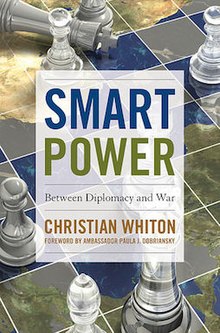
Francis Yoshihiro Fukuyama is an American political scientist, political economist, international relations scholar, and writer.

The Bush Doctrine refers to multiple interrelated foreign policy principles of the 43rd President of the United States, George W. Bush. These principles include unilateralism, preemptive war, and regime change.
The Project for the New American Century (PNAC) was a neoconservative think tank based in Washington, D.C., that focused on United States foreign policy. It was established as a non-profit educational organization in 1997, and founded by William Kristol and Robert Kagan. PNAC's stated goal was "to promote American global leadership". The organization stated that "American leadership is good both for America and for the world", and sought to build support for "a Reaganite policy of military strength and moral clarity".
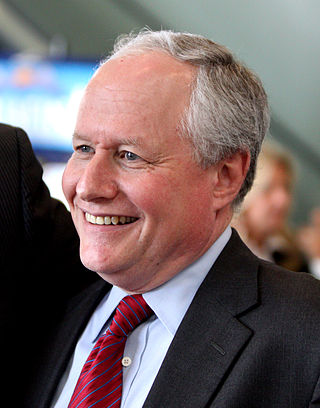
William Kristol is an American neoconservative writer. A frequent commentator on several networks including CNN, he was the founder and editor-at-large of the political magazine The Weekly Standard. Kristol is now editor-at-large of the center-right publication The Bulwark and has been the host of Conversations with Bill Kristol, an interview web program, since 2014.

Richard Norman Perle is an American political advisor who served as the Assistant Secretary of Defense for Global Strategic Affairs under President Ronald Reagan. He began his political career as a senior staff member to Senator Henry "Scoop" Jackson on the Senate Armed Services Committee in the 1970s. He served on the Defense Policy Board Advisory Committee from 1987 to 2004 where he served as chairman from 2001 to 2003 under the Bush administration before resigning due to conflict of interests.
Neoconservatism is a political movement that began in the United States and the United Kingdom in the 1960s during the Vietnam War among foreign policy hawks who became disenchanted with the increasingly pacifist Democratic Party and with the growing New Left and counterculture of the 1960s. Neoconservatives typically advocate the unilateral promotion of democracy and interventionism in international affairs, together with a militaristic and realist philosophy of "peace through strength". They are known for espousing opposition to communism and political radicalism.
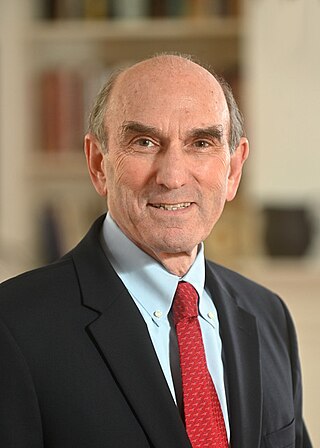
Elliott Abrams is an American politician and lawyer, who has served in foreign policy positions for presidents Ronald Reagan, George W. Bush, and Donald Trump. Abrams is considered to be a neoconservative. He is currently a senior fellow for Middle Eastern studies at the Council on Foreign Relations. He served as the U.S. Special Representative for Venezuela from 2019 to 2021 and as the U.S. Special Representative for Iran from 2020 to 2021.

Edward Nicolae Luttwak is an American author known for his works on grand strategy, military strategy, geoeconomics, military history, and international relations. He is best known for being the author of Coup d'État: A Practical Handbook. His book Strategy: The Logic of War and Peace, also published in Chinese, Russian and ten other languages, is widely used at war colleges around the world. His books are currently published in 29 languages besides English.

John Robert Bolton is an American attorney, diplomat, Republican consultant, and political commentator. He served as the 25th United States Ambassador to the United Nations from 2005 to 2006, and as the 26th United States National Security Advisor from 2018 to 2019.
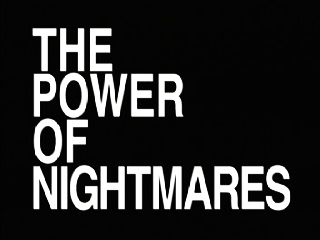
The Power of Nightmares: The Rise of the Politics of Fear is a BBC television documentary series by Adam Curtis. It mainly consists of archive footage, with Curtis narrating. The series was originally broadcast in the United Kingdom in 2004. It has subsequently been aired in multiple countries and shown at various film festivals, including the 2005 Cannes Film Festival.

The Henry Jackson Society (HJS) is a trans-Atlantic foreign policy and national security think tank, based in the United Kingdom. While describing itself as non-partisan, its outlook has been described variously as right-wing, neoliberal, and neoconservative. The Society identifies itself with a "forward strategy" to spread democracy and liberal values globally. It is currently focused primarily on supporting global democracy in the face of threats from China and Russia. The Society is also known for its reports related to Islamic and far-right extremism. The Society is named after the US Senator and leading Democrat, Henry M. Jackson. American political journalist, Michael Allen, described the society as "a non-partisan group that convenes transatlantic center-left, center-right and independent figures committed to Jackson's legacy of 'democratic geopolitics.'"

Lawrence B.Wilkerson is a retired United States Army Colonel and former chief of staff to United States Secretary of State Colin Powell.

Lulu Schwartz is an American Sufi journalist, columnist, and author. She has been published in a variety of media, including The Wall Street Journal. Schwartz worked as a senior policy consultant and held the role of director of "Islam and Democracy Project" at the Foundation for Defense of Democracies (FDD), a neoconservative think-tank based in Washington, D.C. Schwartz is also the founder and executive director of the Washington, D.C.–based Center for Islamic Pluralism and served as a member of Folks Magazine's Editorial Board from 2011 to 2012.
America at the Crossroads: Democracy, Power, and the Neoconservative Legacy is a 2006 book written by Francis Fukuyama.
Gary James Schmitt is an American political scientist who is a senior fellow at the American Enterprise Institute.
In international relations, the term smart power refers to the combination of hard power and soft power strategies. It is defined by the Center for Strategic and International Studies as "an approach that underscores the necessity of a strong military, but also invests heavily in alliances, partnerships, and institutions of all levels to expand one's influence and establish legitimacy of one's action."
The Obama Doctrine is used to describe one or several principles of the foreign policy of U.S. President Barack Obama. In 2015, during an interview with The New York Times, Obama said: "You asked about an Obama doctrine, the doctrine is we will engage, but we preserve all our capabilities".
In the political field, a war of ideas is a confrontation among the ideologies that nations and political groups use to promote their domestic and foreign interests. In a war of ideas, the battle space is the public mind: the belief of the people who compose the population. This ideological conflict is about winning the hearts and minds of the people. Waging a war of ideas can involve think tanks, television programs, journalistic articles, government policies, and public diplomacy. In the monograph: 'Wars of Ideas and The War of Ideas' (2008), Antulio J. Echevarria defined the war of ideas as:
A clash of visions, concepts, and images, and — especially — the interpretation of them. They are, indeed, genuine wars, even though the physical violence might be minimal, because they serve a political, socio-cultural, or economic purpose, and they involve hostile intentions or hostile acts.. .. Four general categories [include]. .. (i) intellectual debates, (ii) ideological wars, (iii) wars over religious dogma, and (iv) advertising campaigns. All of [the categories] are essentially about power and influence, just as with wars over territory and material resources, and their stakes can run very high indeed.

Diplomacy comprises spoken or written communication by representatives of state, intergovernmental, or non-governmental institutions intended to influence events in the international system.
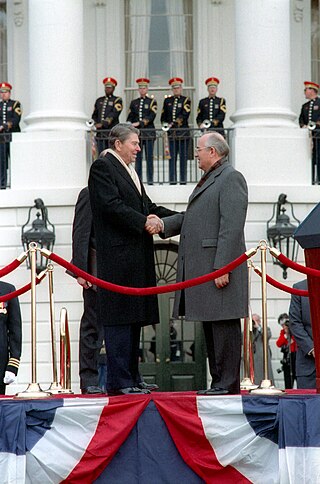
Full spectrum diplomacy is a combination of traditional, government-to-government diplomacy with the many components of public diplomacy as well as the integration of these two functions with other instruments of statecraft. The term was coined by John Lenczowski, founder and president of The Institute of World Politics in Washington, D.C. in his book Full Spectrum Diplomacy and Grand Strategy: Reforming the Structure and Culture of U.S. Foreign Policy which was released in May, 2011.
